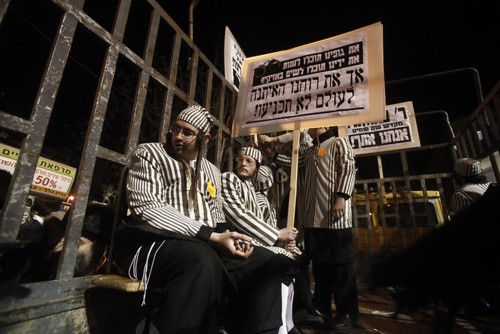
Israel, one might think, would be the last place where the lazy or polemical use of Nazi analogies with present-day Israeli actions and policies would flourish. So I hardly know what to make of stories like this and, more recently, this.
From the earlier article:
No one in Israel really thinks the IDF and the SS are one and the same, or that Palestinian life under the occupation is identical to that of the Jews in the concentration camps, not to mention the extermination camps. But it turns out that IDF soldiers have been drawing such comparisons for years. Quietly, themselves.
…Haaretz correspondent Dan Sagir interviewed a deputy company commander in the armored corps whose unit served in Jenin at the start of the intifada. “The battalion knew we were a company of ‘killers,’” the officer – the son of Holocaust survivors – related. “We were for an aggressive solution. We tried to shoot using all means, we injected gas into schools from which stones were thrown at us. In the battalion we were known as the ‘Auschwitz company’ or the ‘Demjanjuks’ because we made such extensive use of gas.” (Sagir also mentioned another, far older example: the facility where paratroopers are taught to deal with the jolt of the straps when the parachute opens is called “Eichmann” by the soldiers. )
… “The facility has 12 watchtowers. Some of the soldiers are shocked at the resemblance between these towers and other towers, which they learned about in their childhood. In fact, the shock is purely emotional and lacks any factual basis. After all, the watchtowers that appeared in Europe in the 1930s, for example, were mostly made of heavy European wood, whereas the towers of the Gaza shore facility are made of light Israeli metal, manufactured by a factory in Tiberias.”
I’ve said all along there are crucial distinctions to be made. But I wasn’t exactly thinking of construction materials.
Here, in any case, is perhaps the nub of it:
… They precede their stories with “Listen, I am not comparing,” or “It’s not the same thing and there is no connection, but … ” and other expressions of their searing psychological distress. It’s hard to be both victim and victimizer at the same time. The evacuation of a large number of civilians, more than 4,000, including women and children, before a bombing run by the IDF, with the aim of preventing casualties, was dubbed “Schindler’s list.”
… [I]t’s impossible not to compare, there’s no way not to think about it.” [emphases added]
In Israel, at present, the public is convulsed by a group of ultra-orthodox Jews who want nothing less than gender apartheid for the entire country: women at the back of the bus, separate sidewalks and store entrances, that sort of thing.
The debate politely uses the term “exclusion” to refer to women under this gender regime. (Some women are unimpressed with the word and its restricted use, pointing out that it’s just a euphemism for misogyny and gynophobia, should be named as such, and applies to a good deal of secular Israel as well.)
Now the Haredim extremists—there are moderate Haredim as well, who stand appalled—have cleverly appropriated the term for themselves, and recently staged a revolting display in Jerusalem, dressed in Nazi concentration camp clothing with yellow stars bearing the word “Jude.” They claim to be the ones being excluded, and compare their situation to Jews in Nazi Germany persecuted under the Nuremberg Laws. This, too, has produced a considerable outcry, as one might expect.
You really have to rub your eyes and wonder. In Canada, you can be (rightly) admonished when making sloppy and wrong comparisons between the Warsaw Ghetto and the open-air prison that is Gaza, and called an “anti-Semite” into the bargain for so doing. But Israel is where the real battle rages.
The binary Jews/Nazis has always offended and perplexed me. When skinheads attacked Roma or Tamils in Canada, the press used to ring up Bernie Farber of the then-Canadian Jewish Congress for a response, instead of leaders from those communities. It’s as though there were two forces contending in Manichaean fashion, with the rest of us as spectators. In the real world, decent folks of all stripes have a stake in anti-Nazism: to assign this exclusively to Jews is to place upon the latter a burden that all of us should rightfully be carrying.
In Israel, this binary, re/presented, appears to imbue the very fabric of Israeli life. In one respect, this is trivially easy to understand. The experience of the Holocaust, directly and vicariously, brings its strange and ironic eddies, reverberations and echoes. The Nazi is perceived as the exact opposite of a Jew, the quintessential anti-Jew. There are problems with such dialectical oppositions, however, including the impossibility of separating them.
But Jews calling each other Nazis? Calling themselves Nazis? That seems incomprehensible. Crazy-making. Agonizing. As I noted at the outset, I don’t know what to make of this: it needs to be deeply problematized and explored. In the meantime, any analytical hints from commenters would be welcome.
[H/t fern hill, b/c]
